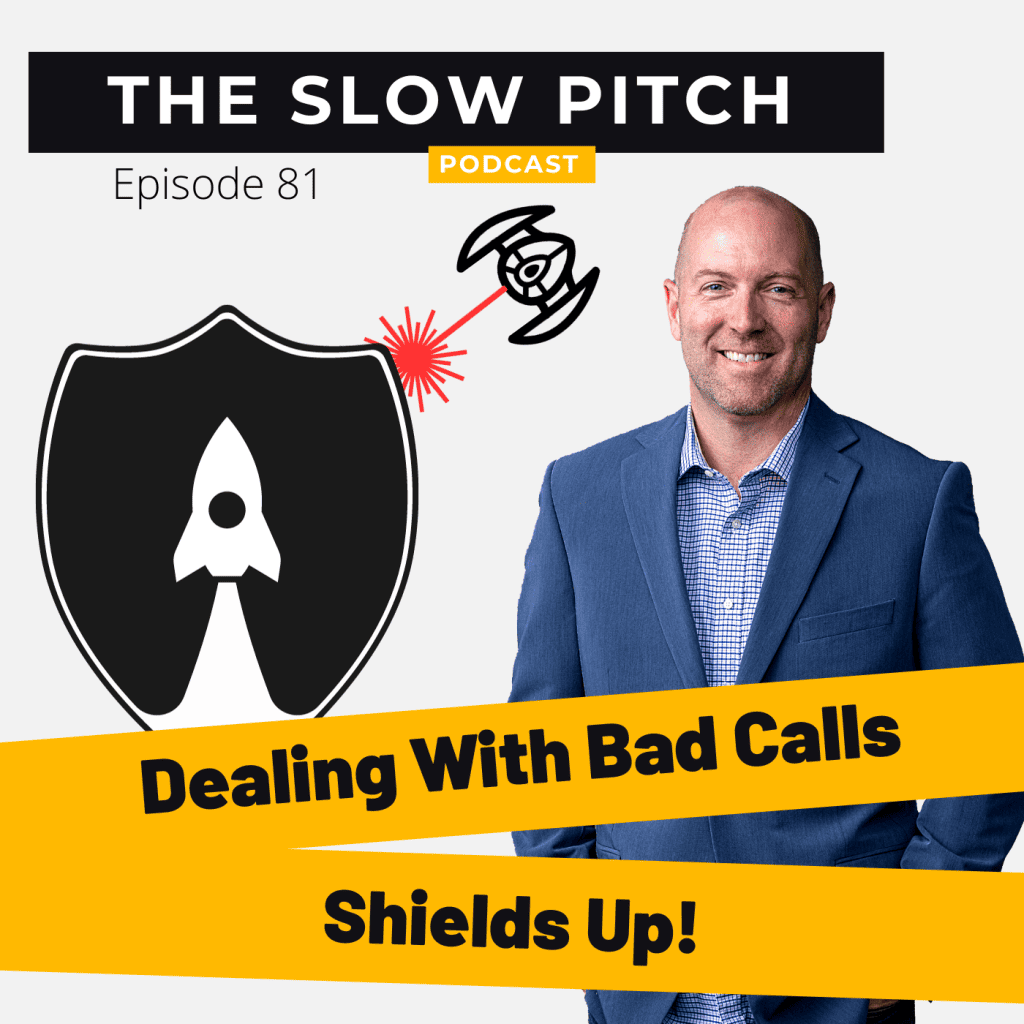Recover From a Bad Sales Call – Using a Star Trek Analogy


Notes
Recover From a Bad Sales Call
Have you ever had a sales call that just went completely wrong? Maybe you felt like you were horrible at your job and can never recover, or the prospect was clearly not interested or and you just couldn’t wait for the call to end. You’re not alone. Everyone has bad sales calls from time to time. It’s part of the job. But the important thing is to know how to recover from them.
In this episode of The Slow Pitch, we’re going to talk about how to recover from a bad sales call using the Star Trek shields analogy. The shields are a protective barrier that protects the ship from enemy attacks. When the shields are up, nothing can penetrate. If you think of yourself as the starship and during a sales call, the prospect starts to attack you personally, it’s time to put up the shields and think like a salesperson. What is the right thing to say now…why are they lashing out? It may have nothing to do with you and everything with their day. When we have a bad sales call, it’s like we’ve been hit by an enemy phaser blast.
Put up the shields and protect the starship, you. Use our mental shields to protect ourselves from the negative impact of bad sales calls.
Here’s how:
- Remember that you are not your sales calls. Just because you had a bad sales call doesn’t mean that you are a bad salesperson. It simply means that you had a bad call.
- Don’t take it personally. It’s easy to take bad sales calls personally, but it’s important to remember that the prospect is not rejecting you, they are rejecting your product or service.
- Learn from your mistakes. Think about what went wrong on the call and what you could do differently next time.
- Move on. Don’t dwell on the bad sales call. The sooner you move on, the sooner you can start making new calls and closing new deals.
By using the Star Trek shields analogy, you can bounce back from a bad sales call reasonably quickly. Next time you have a call that doesn’t go your way, remember: you are the Starship Enterprise, and you are unstoppable.
Additional Tips for Recovering from Sales Call Reluctance
- Call a supportive friend or colleague about how you’re feeling…especially one in sales. They’ve been there.
- Write down what you should have done differently or said differently.
- Remind yourself of your past successes.
- Visualize yourself having a successful sales call.
- Focus on the next call and what you can do to make it a good one.
Remember, everyone has bad sales calls from time to time. The important thing is to learn from your mistakes and keep moving forward. Use the Star Trek shields analogy and the tips above when things go bad and learn from your mistakes.
Bonus Tip:
If you’re a fan of Star Trek, you might enjoy watching the episode “The Naked Time” from the original series. In this episode, the crew of the Enterprise is infected with a virus that causes them to lose their inhibitions. As a result, they start to act out in embarrassing and sometimes destructive ways. However, Captain Kirk is able to resist the effects of the virus by using his strong will and sense of duty. He is able to rally the crew and bring them back to their senses, even in the face of overwhelming odds.
This episode is a great reminder that we all have the potential to overcome even the most difficult challenges. It also teaches us the importance of staying focused and true to ourselves, even when things are tough. When you’re feeling down after a bad sales call, remember Captain Kirk and the crew of the Enterprise. They faced much worse challenges, and they always came out on top. You can too.
Related Posts and Information:
Call Reluctance: Sales Calls Gone Wrong & Don’t Fear the Phone
Attitude vs Taking Action: How Each Affects Sales. The 1, 2 Punch To Get Back on Track.
NOTE: Some links may be affiliate links, which means we get paid a commission when you purchase, but it the cost remains the same for you.
Music: "Clydesdale Funk" by Cast of Characters, written by: Dustin Ransom.
The Episode
Rob 00:08
All right, welcome to The Slow Pitch. And we are talking today about call, let’s call it reluctance. But like when you have that call that just does not go well. And you need to continue to go get more calls done, but you just don’t want to do it. I’ve been there, I know what you’re feeling. Let’s talk about how to get past that feeling.
V/O 00:31
You’re listening to The Slow Pitch Podcast, a podcast about selling less and closing more.
Rob 00:38
So some of this that we’re going to talk about today is a little bit figurative rather than literal, okay? I want you to think about the show Star Trek. And you’re probably like, what does this have to do with sales. But here’s the idea, whenever there was an enemy that was approaching, and they were unable to make communication, and they felt like we are going to be under attack, they would put up their shields, right.
And when the shields went up, nothing really penetrated. Or if it did, it would reduce the impact of anything being hurled or, or shot at them, right. And so basically, what I want you to do is think about yourself as the starship that’s being protected by the forcefield. I know that sounds stupid, I understand that. But hear me out if you think of yourself as this starship, and that nobody can come in and damage you, unless you let them in, and that you are going to be intact, no matter what they say, no matter what they do. It is separate from what is happening.
So I want you to think of yourself as that starship, right. But what I think what you’re trying to do, or what I’m what I’m trying to convey to you is, there is a difference between the role that you’re playing, and the actual person that you are, the person that you are is the you the starship, that is you that is the person that you are, that is something that’s never going to change, that is something that is inherently a good thing. And you’re never going to be anything other than that. Everything else is the outer world.
And what happens is, is that the outer world can be a variety of different things. So we all play different roles throughout the outer world, right. So sometimes you’re in a sales role, sometimes you’re in a spouse role, sometimes you’re in a son role, or a daughter role, where you’re in a parent role, or you’re in these different roles throughout your life, right. So sometimes you have somebody that works for you, you’re the you’re the boss role, you have certain things you have to do and say, whether you like it or not, that is the role that you have.
And so based on that, I want you to think of yourself as your personal self, as the one thing that never gets damaged, never gets changed, never gets impacted by anything being hurled at it. Okay. Now, I know, that’s conceptual. But if you’re thinking about a sales call, and it goes bad, and they start hurling a barrage of insults at you, you know, that’s not for you, right, that’s not you, for you as a person that’s to you as a salesperson towards that role.
Rob 03:08
So if you can separate in your mind, that that was directed at the role that I’m playing, imagine yourself in a play in a movie in a role that is something other than you, all the things that are happening to that role are totally separate from you, because they’re separate from you, you have two things that you can do.
One is roll off, it doesn’t affect you. It’s not you, it’s something different.
Number two, you can analyze from the outside and say, Alright, if that was a sales role, and that was the impact that that person wanted to have on that person, what would they have done differently? What should they have said in that situation, and that’s where we take that journal, that’s where we take that piece of paper, we write it down, and we learn from those roles and the impact that what might be hurled at that role.
So if you can separate yourself from yourself from the outer world, that is going to be critical. But keep in mind, it doesn’t relieve you of the responsibility of developing the skills and committing to the things that you need to do to hit your goals. So just because it was a Role thing again, you must continually get better. And so don’t accept that, okay, well, this is just a role thing. They’re they’re saying this to the Role, and that’s not me. And he just keeps doing the same thing repeatedly, that’s not acceptable either.
If you keep getting the same thing over in that role, then something in that role needs to change and you need to identify what that is and make that a part of that new role’s activities. So, what I want you to do is identify when there’s situations where you feel like I this is personal man, I can’t do this. This is bad. This is not good. I’m this is I’m taking this personal and…
I want you to start to jot down what are the things that you could have done differently in that role, what things would be improved? And then think about it in terms of this is not something somebody would actually say to you, personally and in your face, you just have to stop allowing this to happen this to you personally and only allow it to happen to that role.
V/O 05:09
Do you have a question about sales call or text your question at (608) 708-SLOW. That’s (608) 708-7569. Or you can email them to Questions@TheSlowPitch.com. Now, back to the show.
Rob 05:29
And you have to start to think about when those things come at you. What is an answer…or what is it thing that you could say, to defuse it to change the way that conversation is going and make these individuals who are having that conversation with you that you don’t want to have change and different you can call up with?
I mean, we learned I talked about this a while back, you can call them out. If you talk to everybody this way, or is this just me like that will stop somebody really fast? They’ll you become human then, right? So now all of a sudden, it’s like, oh, oh, yeah, no, I don’t talk to everybody that way.
Rob 06:01
Or you could simply say, hey, I sound like I caught you on a bad day I, I apologize. Is there a better day because I don’t normally get this kind of response. And again, you become more human. And they will tend to typically not have that type of reaction. Again, I’m talking about people who are selling the right way, saying the right things, doing the right things.
But having an adverse reaction, let’s call it from the person that they’re talking to, you have to remember, you are the starship, you are the one who is not touched by anything, because you have your forcefield up, and there’s nothing that’s going to damage or touch you. But when things happen, do the analysis so that you can figure out how to prevent that from happening again in the future.
If you found this helpful, and you think somebody else could use this information, I would invite you to share this episode with somebody by clicking that share button and sending it over to them. I would truly appreciate it, but I’m sure they would appreciate it as well. Until next time, slow down and close more.
V/O 06:59
Thank you for listening to The Slow Pitch. Do you have a question about sales? Call or text your question at (608) 708-SLOW. That’s (608) 708-7569. Or you can email them to Questions@TheSlowPitch.com. Slow Down and Close More?
Rob 07:49
Thanks as always, for listening today. If you’d like this podcast, please subscribe, and leave us a review. We really appreciate it. Follow us on Twitter, Instagram, and Facebook at The Slow Pitch. We were mixed today as always by Johnny Polakis. And we were produced by High Gravity Studios. Music credits and other notes are in the show notes section on, TheSlowPitch.com And we’ll be back with another episode soon.








